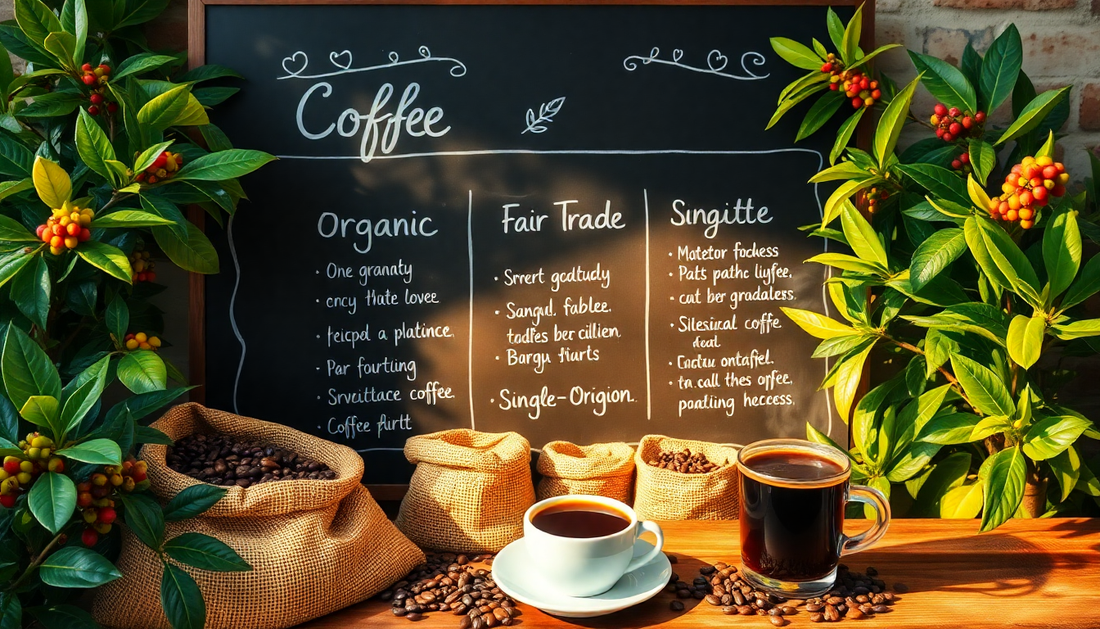
Decoding Coffee Labels: What Do Organic, Fair Trade, and Single-Origin Mean?
As a coffee enthusiast, you've probably noticed the array of labels and certifications adorning your favorite bags of beans. From "organic" to "fair trade" to "single-origin," these terms can be confusing, leaving you wondering what they actually mean. In this blog post, we'll dive into the world of coffee labeling, helping you make informed decisions about the coffee you choose to enjoy.
Understanding Organic Coffee
The "organic" label on a bag of coffee beans indicates that the coffee was grown and processed without the use of synthetic pesticides, fertilizers, or other chemicals. Organic farming practices prioritize sustainable and environmentally-friendly methods, ensuring the coffee is produced in a way that minimizes its impact on the planet.
When you choose organic coffee, you're not only supporting a more eco-conscious approach to agriculture, but you're also ensuring that the coffee you're drinking is free from harmful chemicals. This can be especially important for those with sensitivities or who simply prefer to consume products that are as natural as possible.
Exploring Fair Trade Coffee
The "fair trade" certification is all about ensuring that the coffee farmers and workers who grow and harvest the beans are paid a fair and living wage. This certification also requires that the coffee be produced in safe working conditions, with a focus on supporting the local community and promoting sustainable development.
By choosing fair trade coffee, you're not only enjoying a delicious cup of joe, but you're also making a positive impact on the lives of the people who bring that coffee to your table. Fair trade practices help to empower small-scale farmers, providing them with the resources and support they need to thrive.
Discovering Single-Origin Coffee
Single-origin coffee refers to coffee beans that come from a specific geographic region, often a single farm or cooperative. These beans are typically processed and roasted separately, allowing the unique flavors and characteristics of that particular origin to shine through.
Compared to blended coffees, which combine beans from multiple sources, single-origin coffees offer a more nuanced and complex flavor profile. They can showcase the terroir, or the unique environmental factors that influence the coffee's taste, such as soil, elevation, and climate.
By exploring single-origin coffees, you'll have the opportunity to discover the rich diversity of the coffee world, from the bright and fruity notes of an Ethiopian Yirgacheffe to the smooth and chocolatey tones of a Guatemalan Huehuetenango.
Balancing Your Coffee Preferences
As you navigate the world of coffee labels, it's important to remember that there's no one-size-fits-all approach. The "best" coffee is ultimately the one that aligns with your personal preferences and values.
Some coffee drinkers may prioritize organic certification, while others may be more focused on supporting fair trade practices. And for those who love to explore new flavors, single-origin coffees can be a thrilling adventure.
The key is to experiment and find the coffee that resonates with you. Don't be afraid to try different varieties, roast levels, and brewing methods to discover the perfect cup that suits your taste buds.
Remember, the joy of coffee is in the journey of exploration. So, the next time you're browsing the shelves or scrolling through your favorite online coffee shop, take a moment to decipher those labels and choose the coffee that aligns with your values and preferences. Happy sipping!
Conclusion
In the world of coffee, the labels and certifications can be a maze of information, but understanding them can greatly enhance your coffee-drinking experience. Whether you're seeking organic, fair trade, or single-origin varieties, there's a world of flavors and stories waiting to be discovered.
By making informed choices about the coffee you consume, you're not only enjoying a delicious brew, but you're also supporting sustainable and ethical practices that benefit the entire coffee community. So, the next time you reach for a bag of beans, take a moment to read the labels and let your taste buds and values guide you to the perfect cup.
Happy coffee exploring!
